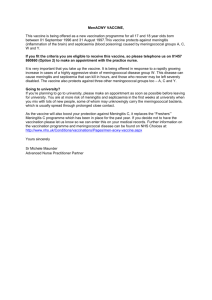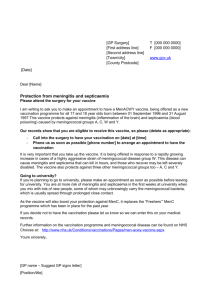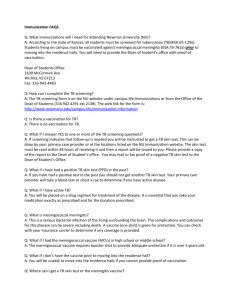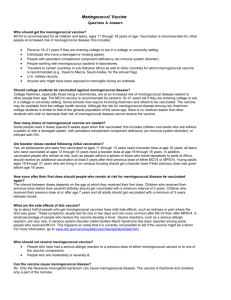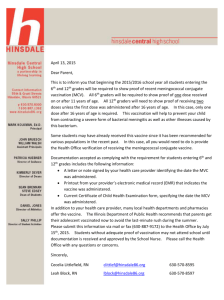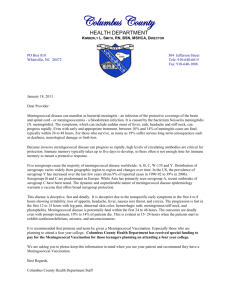MENINGOCOCCALVACCINES W H A T Y O U ... 1 What is meningococcal disease?
advertisement
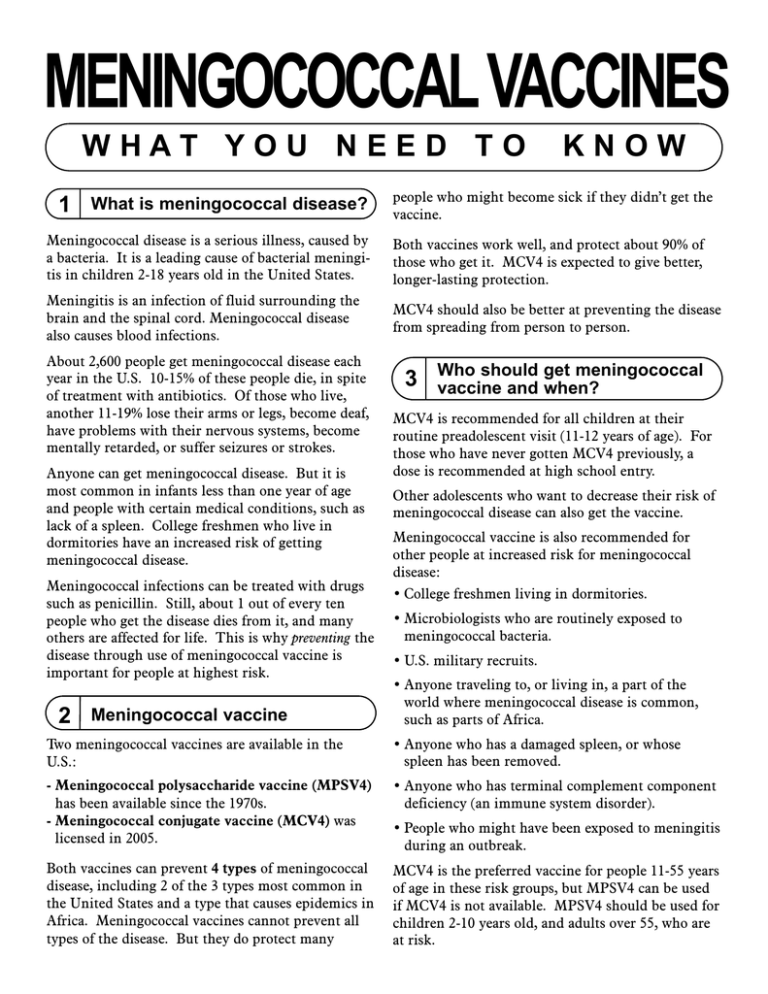
MENINGOCOCCALVACCINES WHAT YOU NEED TO 1 What is meningococcal disease? KNOW people who might become sick if they didn’t get the vaccine. Meningococcal disease is a serious illness, caused by a bacteria. It is a leading cause of bacterial meningitis in children 2-18 years old in the United States. Both vaccines work well, and protect about 90% of those who get it. MCV4 is expected to give better, longer-lasting protection. Meningitis is an infection of fluid surrounding the brain and the spinal cord. Meningococcal disease also causes blood infections. MCV4 should also be better at preventing the disease from spreading from person to person. About 2,600 people get meningococcal disease each year in the U.S. 10-15% of these people die, in spite of treatment with antibiotics. Of those who live, another 11-19% lose their arms or legs, become deaf, have problems with their nervous systems, become mentally retarded, or suffer seizures or strokes. Anyone can get meningococcal disease. But it is most common in infants less than one year of age and people with certain medical conditions, such as lack of a spleen. College freshmen who live in dormitories have an increased risk of getting meningococcal disease. Meningococcal infections can be treated with drugs such as penicillin. Still, about 1 out of every ten people who get the disease dies from it, and many others are affected for life. This is why preventing the disease through use of meningococcal vaccine is important for people at highest risk. 2 Meningococcal vaccine 3 Who should get meningococcal vaccine and when? MCV4 is recommended for all children at their routine preadolescent visit (11-12 years of age). For those who have never gotten MCV4 previously, a dose is recommended at high school entry. Other adolescents who want to decrease their risk of meningococcal disease can also get the vaccine. Meningococcal vaccine is also recommended for other people at increased risk for meningococcal disease: • College freshmen living in dormitories. • Microbiologists who are routinely exposed to meningococcal bacteria. • U.S. military recruits. • Anyone traveling to, or living in, a part of the world where meningococcal disease is common, such as parts of Africa. Two meningococcal vaccines are available in the U.S.: • Anyone who has a damaged spleen, or whose spleen has been removed. - Meningococcal polysaccharide vaccine (MPSV4) has been available since the 1970s. - Meningococcal conjugate vaccine (MCV4) was licensed in 2005. • Anyone who has terminal complement component deficiency (an immune system disorder). Both vaccines can prevent 4 types of meningococcal disease, including 2 of the 3 types most common in the United States and a type that causes epidemics in Africa. Meningococcal vaccines cannot prevent all types of the disease. But they do protect many MCV4 is the preferred vaccine for people 11-55 years of age in these risk groups, but MPSV4 can be used if MCV4 is not available. MPSV4 should be used for children 2-10 years old, and adults over 55, who are at risk. • People who might have been exposed to meningitis during an outbreak. How Many Doses? Severe problems People 2 years of age and older should get 1 dose. (Sometimes an additional dose is recommended for people who remain at high risk. Ask your provider.) • Serious allergic reactions, within a few minutes to a few hours of the shot, are very rare. MPSV4 may be recommended for children 3 months to 2 years of age under special circumstances. These children should get 2 doses, 3 months apart. 4 Some people should not get meningococcal vaccine or should wait • Anyone who has ever had a severe (life-threatening) allergic reaction to a previous dose of either meningococcal vaccine should not get another dose. • Anyone who has a severe (life threatening) allergy to any vaccine component should not get the vaccine. Tell your doctor if you have any severe allergies. • Anyone who is moderately or severely ill at the time the shot is scheduled should probably wait until they recover. Ask your doctor or nurse. People with a mild illness can usually get the vaccine. • Anyone who has ever had Guillain-Barré Syndrome should talk with their doctor before getting MCV4. • Meningococcal vaccines may be given to pregnant women. However, MCV4 is a new vaccine and has not been studied in pregnant women as much as MPSV4 has. It should be used only if clearly needed. • Meningococcal vaccines may be given at the same time as other vaccines. 5 What are the risks from meningococcal vaccines? A vaccine, like any medicine, could possibly cause serious problems, such as severe allergic reactions. The risk of meningococcal vaccine causing serious harm, or death, is extremely small. Mild problems Up to about half of people who get meningococcal vaccines have mild side effects, such as redness or pain where the shot was given. If these problems occur, they usually last for 1 or 2 days. They are more common after MCV4 than after MPSV4. • A few cases of Guillain-Barré Syndrome, a serious nervous system disorder, have been reported among people who got MCV4. There is not enough evidence yet to tell whether they were caused by the vaccine. This is being investigated by health officials. 6 What if there is a moderate or severe reaction? What should I look for? • Any unusual condition, such as a high fever or behavior changes. Signs of a serious allergic reaction can include difficulty breathing, hoarseness or wheezing, hives, paleness, weakness, a fast heart beat or dizziness. What should I do? • Call a doctor, or get the person to a doctor right away. • Tell your doctor what happened, the date and time it happened, and when the vaccination was given. • Ask your doctor, nurse, or health department to report the reaction by filing a Vaccine Adverse Event Reporting System (VAERS) form. Or you can file this report through the VAERS web site at www.vaers.org, or by calling 1-800-822-7967. VAERS does not provide medical advice. 7 How can I learn more? • Ask your doctor or nurse. They can give you the vaccine package insert or suggest other sources of information. • Call your local or state health department. • Contact the Centers for Disease Control and Prevention (CDC): - Call 1-800-232-4636 (1-800-CDC-INFO) - Visit CDC’s National Immunization Program website at www.cdc.gov/nip - Visit CDC’s meningococcal disease website at www.cdc.gov/ncidod/dbmd/diseaseinfo/meningococcal_g.htm - Visit CDC’s Travelers’ Health website at www.cdc.gov/travel A small percentage of people who receive the vaccine develop a fever. department of health and human services Meningococcal 10/7/05 Vaccine Information Statement (Interim) Centers for Disease Control and Prevention National Immunization Program
